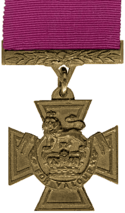Donald John Dean facts for kids
Quick facts for kids
Donald John Dean
|
|
|---|---|
 |
|
| Born | 19 April 1897 Herne Hill, London |
| Died | 9 December 1985 Sittingbourne, Kent |
| Allegiance | |
| Service/ |
|
| Years of service | 1915–1945 |
| Rank | Colonel |
| Service number | 21378 |
| Unit | London Regiment The Queen's Own Royal West Kent Regiment Royal Pioneer Corps |
| Battles/wars | World War I World War II |
| Awards | Victoria Cross Order of the British Empire Order of the Dannebrog Territorial Decoration |
Donald John Dean (19 April 1897 – 9 December 1985) was a brave English soldier. He was awarded the Victoria Cross (VC), which is the highest award for courage in battle given to British and Commonwealth forces. He also received the Order of the British Empire (OBE) and the Territorial Decoration (TD).
Contents
Early Life and First Steps in the Army
Donald John Dean was born in Herne Hill, South London, on April 19, 1897. He went to school at Quernmore College.
When World War I started in August 1914, Donald tried to join the army. However, he was too young at 17 and was not allowed to enlist. Instead, he became a special police officer and joined a part-time home defense group called the Volunteer Training Corps.
When he turned 18 in April 1915, he tried again and successfully joined the army. He served as a private soldier with the 28th London Regiment. He fought in important battles like the Ypres Salient and the Battle of the Somme. In October 1916, he became an officer in the Queen's Own Royal West Kent Regiment. He then fought in battles at Vimy Ridge and near Givenchy.
A Heroic Act: The Victoria Cross
Donald Dean was 21 years old and a temporary lieutenant when he performed an act of great bravery that earned him the Victoria Cross. This happened between September 24 and 26, 1918, near Lens, France.
Lieutenant Dean and his group of soldiers held a forward position in a trench they had just captured from the enemy. The trench was not ready for defense, so Lieutenant Dean worked tirelessly with his men to make it stronger, even while under very heavy enemy fire. The enemy attacked their position five times, and each time, Lieutenant Dean and his men pushed them back. During all this time, Lieutenant Dean inspired his soldiers with his own bravery and showed amazing leadership and dedication to his duty.
On February 15, 1919, King George V personally gave Donald Dean his Victoria Cross medal at Buckingham Palace. His hometown of Sittingbourne also held a special celebration for him.
Between the World Wars
After World War I, Donald Dean continued his military service part-time with the Territorial Army. He became a captain in July 1921 and later a major in 1930. By 1936, he was a lieutenant colonel and commanded a battalion.
Serving in World War II
When World War II began in 1939, Donald Dean faced a challenge. His commander decided that regular army officers should lead battalions, so Donald was replaced. Even though he was very disappointed, he agreed to take on a new role. He became a Group Commander in the Auxiliary Military Pioneer Corps. This corps was made up of soldiers who mainly did labor tasks, like building and digging. Many of them were volunteers who had been unemployed or conscripts who were not fit for other combat roles.
The Retreat from France
Donald Dean's group was sent to France with the British Expeditionary Force. They had very little equipment, with only one rifle for every four men, and they worked on labor tasks without much training.
In May 1940, the German army advanced quickly, and Donald's group was ordered to evacuate. They had no transport, so Donald marched his men to a town called Saint-Pol. The train system was in chaos, so Donald had to bribe the station master to get a train. After a short fight with German soldiers, his group managed to reach Wimereux near Boulogne-sur-Mer.
At Boulogne, Donald was asked to send some of his men to the harbor to help load ships. He then had to provide 800 of his pioneers to fill a 3-mile gap in the defenses around the town. He armed them with rifles from the other pioneers who were evacuating. They had no heavy weapons, so Donald directed them to build roadblocks from anything they could find, hoping to slow down the German tanks.
On May 23, the Germans attacked fiercely. In tough fighting at their barricades, the pioneers even claimed to have destroyed a tank by setting petrol on fire underneath it. Donald's pioneers were the last unit to pull back from the defenses. He made sure that as many of his men as possible were evacuated before he was the very last person to board the final destroyer leaving the harbor.
Later in the war, Donald Dean served in Madagascar and Italy. He was mentioned in official reports twice for his good service and was promoted to full colonel in 1945. He also served as a Deputy Lieutenant of Kent.
Family Life
In 1923, Donald Dean married Marjorie Wood. They had a son and a daughter.

